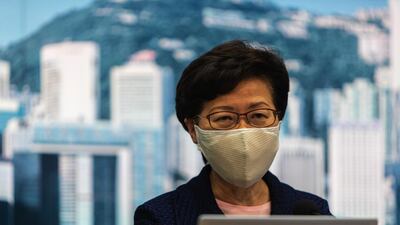Hong Kong leader Carrie Lam on Friday postponed the September 6 election for the city's legislature by one year because of a spike in coronavirus cases, dealing a blow to the pro-democracy opposition hoping to make gains in the vote.
The opposition had aimed to ride a wave of resentment over a new national security law, that Beijing imposed on the city on June 30, to win a majority in the Legislative Council, where half the seats are directly elected with the other half filled mostly by pro-Beijing appointees.
The postponement comes after 12 pro-democracy candidates were disqualified from running in the poll, for reasons including perceived subversive intentions, opposition to the new security law and campaigning to win a legislation-blocking majority.
Ms Lam, who said the election would be held on September 5 next year, told reporters the decision was the most difficult she had made in seven months and it was aimed at safeguarding people's health.
"We have 3 million voters going out in one day across Hong Kong, such flow of people would cause high risk of infection," she said.
The Beijing-backed leader said she had to invoke an emergency law to make the postponement and no political considerations were involved in the decision. China's parliament would decide how to fill the legislative vacuum created by the delay.
The election would have been the former British colony's first official vote since Beijing imposed the security law to tackle what China broadly defines as secession, subversion, terrorism and collusion with foreign forces, with punishment of up to life in prison.
Hong Kong returned to Chinese rule in 1997 under a guarantee of autonomy but critics say the new law undermines the Chinese-ruled city's high degree of autonomy and puts it on a more authoritarian path.
The Chinese and Hong Kong governments say the law will not undermine Hong Kong's freedoms and is necessary to preserve order and prosperity after months of often-violent anti-government protests last year.
Chinese foreign ministry spokesman Wang Wending said earlier that Hong Kong's coronavirus outbreak was a factor in its elections, which were a domestic issue.
News of the postponement came as the nomination period for candidates seeking to run in the election closed.
Among the 12 opposition candidates disqualified was Joshua Wong, who rose to fame leading protests in Hong Kong as a teenager in 2012 and 2014.
"Barring me from running ... would not stop our cause for democracy," said Mr Wong, 23,
Mr Wong, who China calls a "black hand" of foreign forces, said his disqualification was "invalid and ridiculous" and the new law a "legal weapon used against dissidents".
The government denies political censorship or suppression of the right to run for the legislature.
Authorities also disqualified some members of the Civic Party, a moderate, old-guard opposition group, and others who won an unofficial "primary" vote held by the opposition camp this month.
That independently organised vote saw a younger, more defiant generation of democrats taking over the helm of the opposition, but the Civic Party disqualifications signal Beijing is becoming less tolerant of even moderate voices.
Former colonial power Britain said it was clear the candidates had been barred because of their political views. Hong Kong's last British governor, Chris Patten, called it an "outrageous political purge".
Hong Kong has reported more than 3,000 coronavirus cases since January, far lower than in other major cities around the world.
But for the past 10 days, the number of new infections has been in the triple-digits.
Nevertheless, government critics are likely to question the justification for the postponement.
Rival finance hub Singapore, which has had a larger coronavirus outbreak, held a general election in July.
At least 68 countries and territories have delayed national or regional polls due to coronavirus since February, said the International Institute for Democracy and Electoral Assistance.
But at least 49 countries and territories have decided to hold elections, it said.

